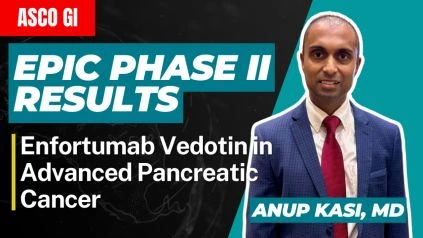Anup Kasi, MD: [00:00:00] So this is an investigative initiated trial called the EPIC trial. Where we’re investigating n fotamibidotin, which is an antibody drug conjugate as a single arm, non randomized. Phase two study a single institution study at our site at University of Kansas in patients with advanced pancreatic cancer in the second line and beyond setting.
As a phase two study, this primary objective of this study is looking at the objective response rate. And then we do have some secondary objectives such as OS, PFS, and safety analysis as well.
OncologyTube: Given the aberrant overexpression of NECTIN4 and pancreatic adenocarcinoma and its association with pro oncogenic processes, how do you anticipate enfortumab Vendotin might specifically target this pathway to inhibit tumor growth in pancreatic cancer
Anup Kasi, MD: patients?
Yeah, that’s a great question and that’s the fascinating science behind [00:01:00] this drug. So NECTIN4 is overexpressed in pancreatic cancer. If you look at the IHC expressions, majority, 70 percent and above, of them do have NECTIN4 expressions and about 15 percent or so have much higher expressions. And so this drug It binds to NECTIN4 four, the antibody, and then the antibody is linked with a linker protein.
It’s linked to the payload, which is called MMAE monomethyl autos statin, e which is a microtubule poison pretty much. So it’s like a smart bomb, if you will, where the drug finds the target neck, ten four, and then gets internalized. The link of protein is cleaved, and then the microtubules.
Poison kills the cancer cell. And that’s the the theory behind it. So that’s how we hope it works and shrinks tumors and hopefully patients benefit from it. It has been approved in bladder cancer. The study has also been completed in [00:02:00] breast cancer and shown positive outcomes.
So we’re hopeful that pancreatic cancer patients benefit from it too. Excellent.
OncologyTube: Could you explain the rationale behind requiring both Pre-treatment and on-treatment biopsies. In this phase two trial, I fort amount of Vendotin for pancreatic adenocarcinoma. What insights are you hoping to gain from these biopsies regarding treatment response and potential mechanisms of action?
Anup Kasi, MD: Yeah, that’s a good question too, because we want to understand the mechanism of action of the drug and how it interacts with what we call the tumor microenvironment. So a lot of unknowns in pancreatic cancer from that standpoint, especially with antibody drug conjugates. So the goal is to get baseline biopsies for these patients.
We’ll be looking at the neck and foot expression levels, also looking at the what we call as the molecular and the genetic makeup of the tumor and then look at post treatment after first cycle of treatment, we’ll repeat a biopsy [00:03:00] and look at any dynamic changes in the NIC104 expression levels as well as correlate the genomic profiling of the tumor to outcomes in these patients.
OncologyTube: Okay, can you elaborate on the significance of using a Simon’s two stage minimax design for patient accrual and response assessment in this trial? What outcomes or response rates are considered promising for further investigation of EV in pancreatic adenocarcinoma?
Anup Kasi, MD: Yeah, as a, phase two single arm study design, I think it’s a standard practice to use a Simon two stage design where an we can have a two stage where the first stage we accrue.
For example, in this case, we have 18 patients that we accrue on the first stage and then we look at their responses. So we expect at least one patient or more to respond to have what we call is a partial response, a shrinkage in the tumor. And if they do, then we accrue to the [00:04:00] second stage of the study, which is an additional.
10 patients for a total of 28 patients. And so that there we expect more than three patients to respond to have a shrinkage in the tumor. So that would give us a response rate of 15 percent or higher. And that would be successful, especially since this trial does allow patients after second line and beyond setting.
So they may have had more than one line of treatment. And in those patients, generally response rates would be 2 percent or less. So having a response rate of 15 percent as our threshold for this trial, I think is a very appropriate benchmark for us to then investigate that in larger trials. Great.
OncologyTube: Are there any key takeaways that you’d like to leave our oncologist viewers with on this trial?
Anup Kasi, MD: On this trial. Yeah, this is an ongoing trial. As I said, I think the antibody drug conjugate and the mechanism of the action and the science behind it is really fascinating. And [00:05:00] since it’s targeted against NECTIN4, which is expressed highly in pancreatic cancers and extrapolating from other tumor types where targeting NECTIN4 has worked well for breast cancers, bladder cancers.
So I’m hopeful that it works well here too. So the trial is ongoing hopefully in the next year we should be able to complete accrual. We’ll have the results read out and maybe we’ll present the data at one of the ASCO meetings. So more to come.
OncologyTube: Okay. This has been an interview with Dr. Anup Kasi, MD Medical Doctor Associate Professor, Vice Chair of GI Oncology, University of Kansas Medical Center.
Dr. Kazi, thank you so much for chatting with us today.
Anup Kasi, MD: Thanks. Thanks for having me.

